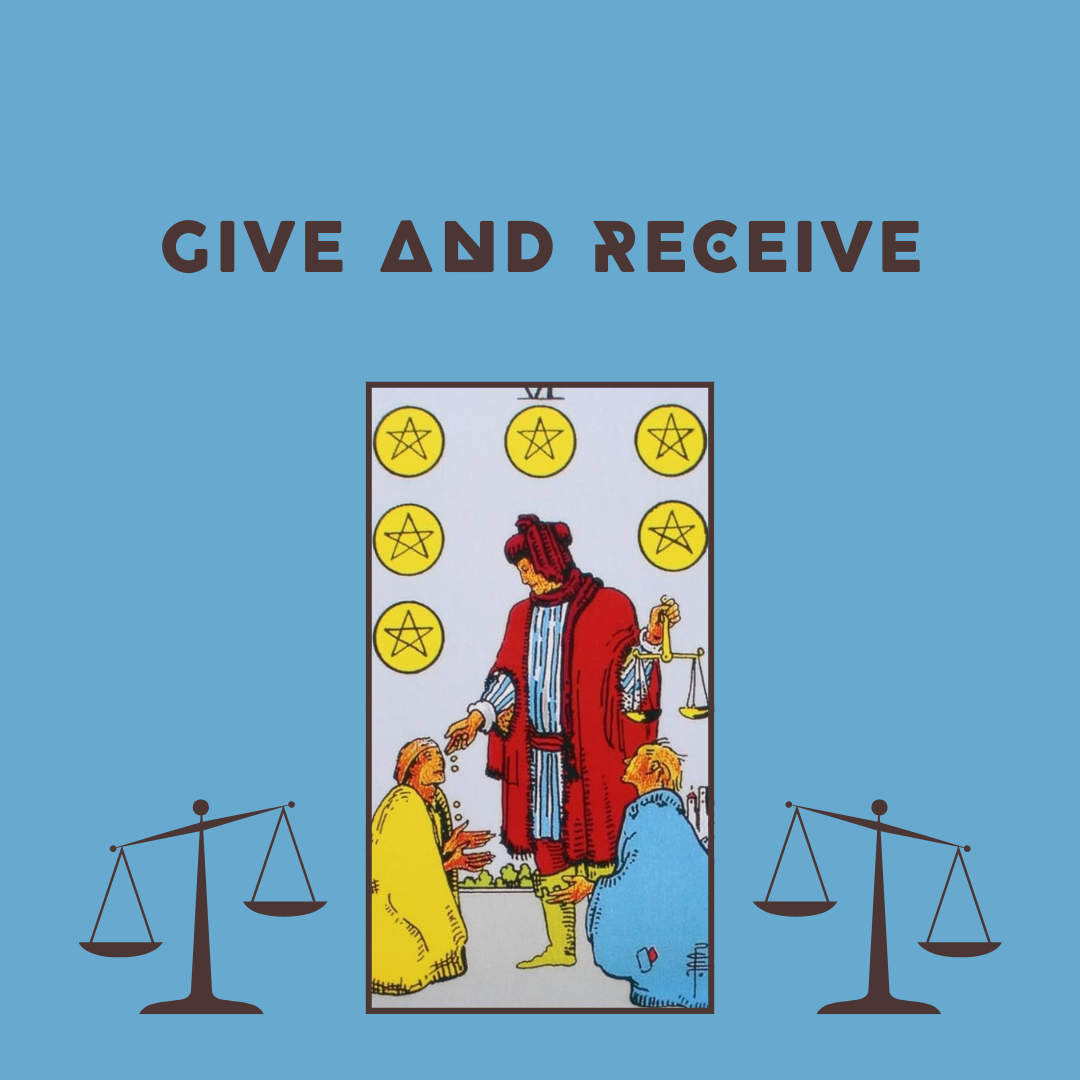The Six of Pentacles depicts an active scene with many characters engaged in it. Standing upright in a lush, red robe, expensive leather boots and a red felt hat, we see a wealthy merchant, giving money or alms to the poor. Seated below the successful businessman are two beggars, in clothes that are non-discreet and torn, with their hands outstretched, asking for help. In the distant background is a grey sky and a city that is probably where the merchant does most of his buying and selling. One of the merchant’s hands stretches out to toss some coins to the homeless people below him, while the other hand holds a golden scale, which hangs, balanced, and is key to the underlying messages present in this card.
Historically speaking, Egyptian mythology tells us that entry into the afterlife was secure only after the weighing of the deceased person’s heart. Ancient pictographs depict the gods placing the deceased’s heart on a large golden scale opposite the feather of Ma’at. Ma'at was an ancient Egyptian goddess representing truth, justice, reciprocity and harmony, as well as cosmic order. Those whose hearts were full of honorable deeds would pass into the afterlife but hearts heavy with misdeeds would tip the scales and then be devoured by Ammit—a grotesque and ghastly creature with the head of a crocodile and the body of a lion. Long before scales weighed coins in relation to commerce, and eons before they showed us how many pounds we gained after eating too much over the holidays, scales were spiritual tools that put into question the balance of the human heart.
The figures in the Six of Pentacles do the same thing. We see quite clearly the relationship between giving and receiving. Most of our relationships exist in some form of give and take – but how balanced is that relationship? Do we take more than we give? Or do we give more than we receive? Both imbalances cause problems – from burnout and resentment when we give too much to a lack of self-esteem and responsibility when we take and take without giving back. This card shows itself in a reading to remind us of the vital role equality plays in reciprocal relationships. We see the scales are balanced – but is that how they play out in our own private lives? It’s time to assess where we stand with others and whether or not we need to readjust specific relationships – from personal to business, as they all require balance. They all ask us to walk a fine line between giving and receiving.
A plant which any merchant would covet is Basil (Ocimum basilicum), and though native to India, central Africa and Southeast Asia, it has become one of the culinary world’s most popular herbs, finding its way into dishes from every corner of the planet. With over 150 distinct types of basil now currently cultivated, this pungent member of the mint family (Lamiaceae) has been long upheld as a plant of luck and good fortune. In fact, its name comes from the Greek word Basileus, meaning “King.” Later in European cultures, it was believed that carrying a sprig of it in a coat pocket could bring good fortune or ward off evil spirits that might impede financial success. Though it remains to be seen if Basil can impact financial health, numerous studies have shown that it does have multiple health benefits, including its role in reducing inflammation, improving digestion, and acting as an antioxidant. It's a nutritious source of vitamins and minerals like vitamin K, A, and C, and provides nutrients essential for bone health, blood clotting and overall healthy blood circulation.
Let the Six of Pentacles and Basil be a guide to balanced relationships and successful endeavors – the key to both is balance and harmony. They are within our reach if we can be truthful with ourselves about how much we give and take – and if we are willing to work for equitable and reciprocal associations.
*Tarot reading is based on the Rider-Waite Tarot Card deck, illustrated by Pamela Colman Smith
References
Dorsey, Angela. “History, Lore and Magic of Basil,” Stillroom Adventures, 9 May 2017.
https://stillroomadventures2.blogspot.com/2017/05/history-lore-and-magic-of-basil.html
Martin, Joseph D. and Mody, Cyrus C. M. Between Making and Knowing: Tools in the History of Materials Research. WSPC Encyclopedia of the Development and History of Materials Science, vol. 1. Singapore: World Scientific, 2020.
Pollack, Rachel. Seventy-Eight Degrees of Wisdom. San Francisco, Red Wheel/Weiser, LLC, 2007. P247-251
Vasquez, Isabel, RD LDN. “Health Benefits of Basil.” Health, 8 July 2024. https://www.health.com/basil-benefits-8662991#:~:text=Basil%20is%20a%20simple%20way,5

